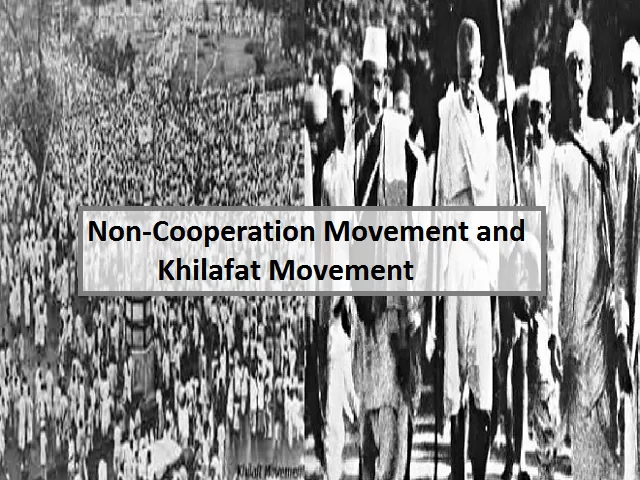In 1919-1922 both the movements namely Non-Cooperation and Khilafat Movement were organised to oppose British rule in India. Despite having different issues of the movements then also adopted a unified plan of action of non-violence and non-cooperation.
There was the unification of Congress and the Muslim League at this time period. Various political demonstrations took place with the joint effort of both these parties.
The growing indignation against British rule led to the launching of the Khilafat and Non-Cooperation movement. Turkey had fought against Britain in the First World War. Turkey, which was one of the defeated countries, suffered injustices at the hands of Britain. In 1919, a movement was organised under the leadership of Mohammad Ali and Shaukat Ali (popularly known as Ali brothers), Abul Kalam Azad, Hasrat Mohani, and others to force the Britain government to undo these injustices.
About Khilafat Movement and Non-Cooperation Movement
The Khilafat committee which was set up to conduct this movement was joined by Gandhi. The sultan of Turkey was also considered the Caliph or Khalifa, the religious head of the Muslims. Therefore, the movement over the question of the injustice done to Turkey was called the Khilafat movement. It gave a call for non-cooperation. The movement on the Khilafat question soon merged with the movement against the repression in Punjab and for swaraj.
The Khilafat committee which was set up to conduct this movement was joined by Mahatma Gandhi. The sultan of Turkey was also considered the Caliph or Khalifa, the religious head of the Muslims. Therefore, the movement over the question of the injustice done to Turkey was called the khilafat movement. It gave a call for non-cooperation. The movement on the Khilafat question soon merged with the movement against the repression in Punjab and for swaraj.
The movement was aimed at undoing the injustices done to Punjab and Turkey, and the attainment of Swaraj. It is called the Non-Cooperation movement because of the methods adopted in this movement. It began with the renunciation of honorary titles like ‘Sir’ that Indians had received from the British government.
Subramania Iyer and Rabindranath Tagore had already done so. Gandhiji returned his Kaiser-I-Hind medal in August 1920. Many others followed. Indians no longer thought it honourable to receive titles from the British government and thus to be associated with it. This was followed by the boycott of legislatures.
Most people have refused to cast their votes when elections to the legislatures were held. Thousands of students and teachers left schools and colleges. New educational institutions like the Jamia Millia at Aligarh (later shifted to Delhi) and Kashi Vidyapeeth at Benaras were started by nationalists. Government servants resigned their jobs. Lawyers boycotted law courts.
The foreign cloth was burnt in bonfires. There were strikes and hartals all over the country. The movement was a great success and the firings and arrests could not stop it.
Before the year 1921 was out, 30,000 people were in jail. They included most of the prominent leaders. Gandhiji however, was still free. A rebellion had broken out in some parts of Kerala. The rebels were mostly Moplah peasants; hence it is called the Moplah rebellion. The rebellion was suppressed by terrible brutalities. More than 2000 Moplah were killed and about 45,000 arrested. An example of the brutalities was the suffocation to death of 67 Moplah prisoners in a railway wagon when they were being shifted from one place to another.
1921 Session of the Congress
The 1921 session of the congress was held at Ahmedabad. It was presided over by Hakim Ajmal Khan. The session decided to continue the movement and to launch the final stage of the non-cooperation movement. This was to be done by giving a call to the people to refuse to pay taxes. It was started by Gandhiji in Bardoli in Gujarat. It was a very important stage because when people openly declare that they would not pay taxes to the government, they mean that they no longer recognise that the government is legitimate.
Why did Mahatma Gandhi withdraw from the Non-Cooperation Movement?
Gandhi ji had always emphasized that the entire movement should be peaceful. However, people were not always able to contain themselves. At Chauri Chaura in U.P., on 5th February 1922, the police, without any provocation, fired at the people who were taking part in a demonstration. The people, in their anger, attacked the police station and set it on fire. 22 policemen were killed inside the police station.
Gandhiji had made it a condition that the movement should remain completely peaceful. Gandhiji, hearing the news of the incident, called off the movement.
On 10th March 1922, he was arrested and sentenced to six years imprisonment. With the calling off of the movement, one more phase of the nationalist movement was over. In this movement, a large mass of people participated all over the country. It spread to the villages also. People came out in open defiance of the government to demand Swaraj. The movement also strengthened the unity between the Hindus and the Muslims. One of the most popular slogans during the movement was “Hindu Musalman Ki Jai”.
Also, Read
